#please add any others you have
Text
On this Shabbos and as Hanukkah draws near (Dec 7th), I'd like to share this article, one of the only guides I've been able to find on where to buy candles for Shabbos/Hanukkah/etc that don't support the Jewish National Fund. For those unfamiliar with the JNF, it is a Zionist organization formed in 1901 to buy land for Jewish settlement, and among other things has been responsible for much of the ecological "development" (read: colonialism) of Palestine. One of its main efforts is in soliciting money from diaspora Jews to fund the Zionist project, and many of the larger brands of Judicia donate a portion of their proceeds to it. As Hanukkah candles begin appearing in stores, you might check the box and note a JNF logo on the side.
This is a list of candle companies that specifically do not donate a part of their proceeds to the JNF, one of the only articles of its kind I've never been able to find. The companies listed aren't all necessarily anti-Zionist or don't donate to Israel in other ways - I'd recommend researching bigger names like Manischewitz, for example - but Narrow Bridges Candles IS anti-zionist and explicitly supports and promotes BDS. I've bought from them before, they make beautiful beeswax candles of all kinds, and would highly recommend you get your holiday candles here if it's financially doable.
Good Shabbos and have a safe and beautiful Hanukkah, when you remember the miracle of the eight nights remember also the people of Gaza and the scarcity there.
#palestine#hanukkah#bds#please add on if you know of any others or if you have any other info or corrections!#anti zionisim#jewish anti zionism
9K notes
·
View notes
Text
Thinking about how Diavolo’s feelings transcend time and how in the Nightbringer UR+ card Demon Lord’s Castle Tour this conversation happens.
When asked, “Do you wish to see your father?”
Diavolo responds:
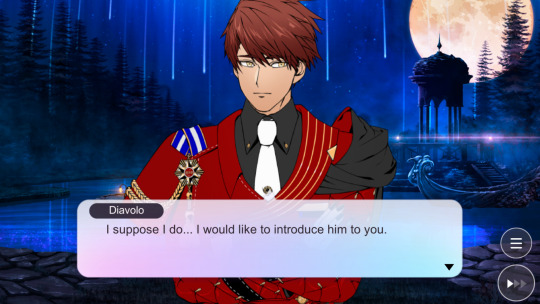
“I suppose I do . . .” isn’t the typical reaction to how a child would feel about wanting to see their parent. Especially when said parent has essentially been in a coma for a year.
Along with how Diavolo describe his father.

It makes more sense why when you learn in Lesson 56 how Diavolo was treated by him growing up.




Diavolo can tell when others are lying but is unable to understand his father’s intentions.
Diavolo mentions that he lived a very sheltered life growing up. That from a young age his father never allowed him a chance to talk to anyone outside the castle.
His childhood friend was Mephistopheles. A demon literally RAISED to be his friend. Putting a barrier between the two because Mephistopheles would put Diavolo on a pedestal.
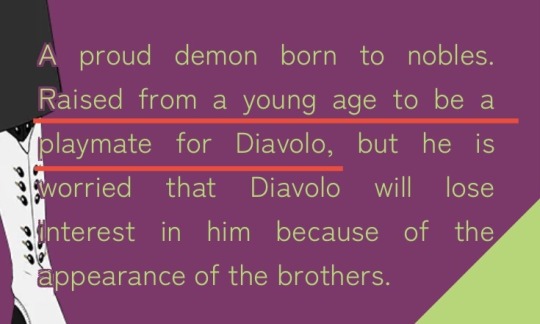
The isolating childhood he experienced riddled with his strict father constantly scolding him.


Despite everything MC is so important to him he wants to see his father again so we can meet.
#Demons and Humans can’t get married even in the present so it adds an extra layer him wanting to introduce us.#There’s a lot more you could add onto this (please do I’d love to hear other’s thoughts).#Like how Diavolo’s childhood affected him just look at the way he describes himself:#“The truth is I am a child in a way. A child who spends his time alone and never gets to do anything interesting.”#A lot of Diavolo’s poor behavior while not excused comes from his childhood.#How Diavolo admits to using his position to force others to do what he wants. Along with how he doesn’t like sharing.#Diavolo’s insecurities in his friendships with others.#Mainly Lucifer and Barbatos which makes sense with how they happened.#IE Forcing Barbatos to become his butler and the oath/deal with Lucifer regarding Lilith.#It’s clear Diavolo is very lonely and carrying a heavy burden.#I like that MCs presence is helping him change into a better person.#Also I don’t think Diavolo hates his father their relationship just isn’t good and very complicated.#Diavolo is such a wonderful character if you have any in-depth posts about him please tag me I’d love to read them!!!#I AM FILLED WITH SAPPY THOUGHTS ABOUT DIAVOLO TONIGHT!!!!#Obey Me#Obey Me Spoiler#Obey Me Nightbringer#OMSWD#Obey Me Diavolo#Diavolo#MaddyMajolish#Is it obvious I can’t sleep because I’m riddled with Blorbo thoughts
5K notes
·
View notes
Text
We need to remember that Shubble stated that Wilbur would manipulate and gaslight friends and family. With this, we must be patient with streamers that were close to Wilbur. This was likely surprising and shocking for them. They may need time to come to terms with what has happened.
I have been vocal about how important it is for men to be critical about abusive behaviors. However, Wilbur had many close friends—some would even consider him family—and now they may feel they hardly knew him at all.
There is a deep stress felt by viewers. It is difficult to think we have given any amount of time or money to an abuser. Could you imagine a close friend right now? The pain and betrayal must sear. They need time to understand what has happened and come to terms with it. Many of them may not be live in the coming days (weeks even).
That being said, as time passes, criticism may be necessary. Complacency is not an option. Men that are willing to ignore abuse to protect an abuser are just as pathetic as the abusers themselves.
Let's give this situation time to breathe. I ask that we give patience and courtesy to those close to Wilbur at this time. But please do not forget that this happened. There may be a few streamers hoping to lay low and then drop a collab in a few months. Do not let them. This is too important.
#for now#the best thing we can do is spread awareness about abuse and offer support to domestic violence victims#i also want to add#that any previous art made about him was made with pure intentions#obviously its up to each individual to decide where the line is#but maybe lets not support him monetarily moving forward#that seems to be the move#anyway#please be kind to each other and give each other space#especially domestic violence survivors that may be here with us#and those who may have realized they were/are abused from shubbles story#i want to offer her and everyone around as much support as i can#if any domestic violence survivers have any stories they want to share#my dms and askbox are open#if anyone suspects that someone in their life may be abusing someone#this offer is open to you too#we need to talk about this#thoughts of dante#wilbur soot#shubble#im tagging this under shubble even though the post isnt really about her but i want the tags of this post to reach#whoever needs to read them
874 notes
·
View notes
Text
three romanian authors to read with ur dracula daily
dracula is an orientalist text conceived at the height of british empire, grounded in distortions of a region that stoker never visited. sadly (and unsurprisingly) i found very few romanian authors who have been translated into english online, so here’s a meagre list of recs:
1. luminița cioabă
romanian roma author, famous in romania as the daughter of bulibasha (the king of the roma nation), she forged her own path as a writer of short stories in the oral roma tradition which portray in vivid detail the history of the roma people of romania
the birch grove
queen of the night and stone flower
meralda
from her book, the lost country
2. marin sorescu
from humble rural romanian roots, he wrote under the oppressive ceausescu government. in a national ironic tradition he very famously said: "Just as I can't give up smoking because I don't smoke, I can't give up writing because I have no talent." some of my favorite poems:
the sea shell (1983)
carbon paper (1980)
creation (1992)
3. paul celan
jewish poet from bucovina. i recommend this beautiful essay by ilya kaminsky, who like celan was forced to flee eastern europe due to antisemitism, deconstructing various translators’ attempts to adapt celan’s texts and experience of the holocaust. these are all poems from a 1971 poetry collection
all souls
leap-centuries
language mesh and night
homecoming
#dracula daily#dracula#romanian lit#romania#romanian literature#romanian#romanian writers#romani writers#jewish writers#bookblr#recs#please feel free to add if you have any other translation recs
13K notes
·
View notes
Text

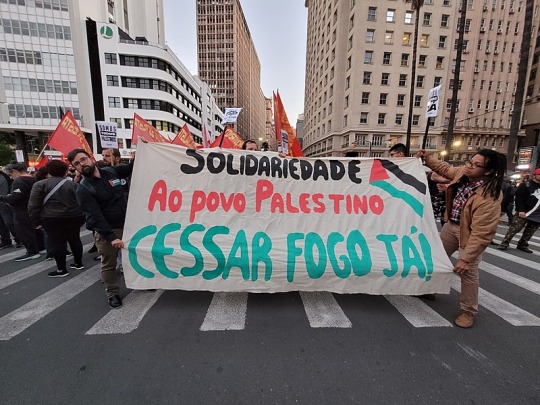









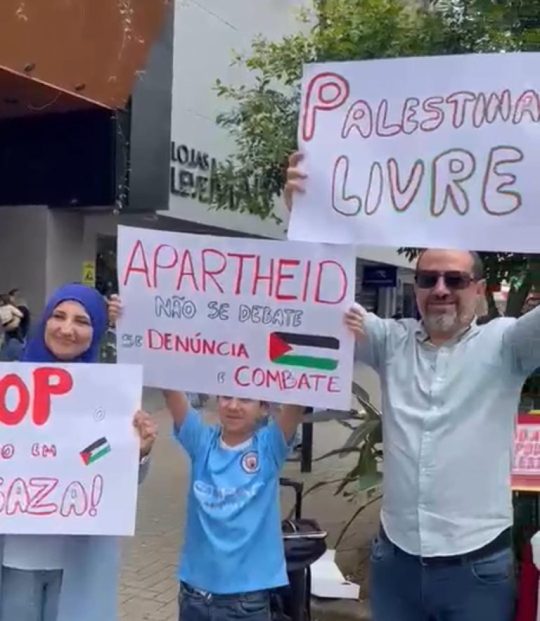

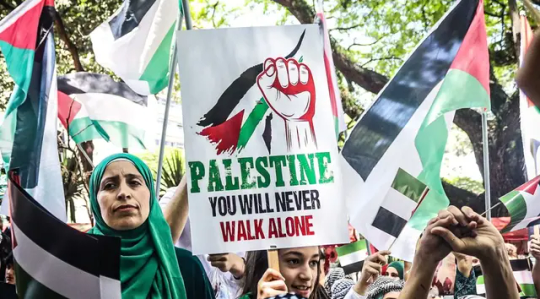


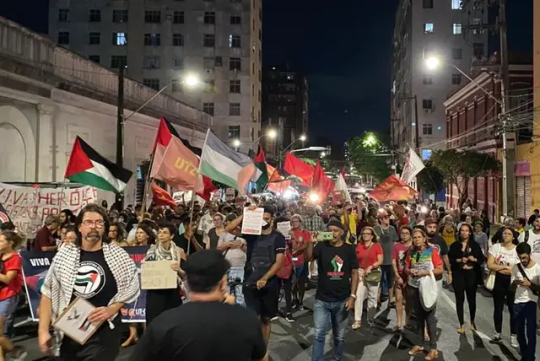
Pro-Palestine manifestations in Brazil on October 2023.
#politics#brazil#palestine#israel#gaza#brazilian politics#mod nise da silveira#image description in alt#originals#if you have any cities or protests in other days to add please tell me so i can reblog this with additions
536 notes
·
View notes
Text
There was a beautiful era in the 90s/early 00s of fun, female lead teen movies that just hit different, were like this golden age of girls just being girls and celebrating that feeling, and no matter how Hollywood tries they will never replicate it.
I'm talking "She's the Man," "Bend it Like Beckham" "Princess Dairies" "St. Trinian's" "What a Girl Wants" "Clueless" "Uptown Girls" "John Tucker Must Die" "DEBS".....obviously there's probably a few I missed but you get the idea.
Maybe the stakes weren't as high as saving the entire world, but they were important to the characters and had friendships and silliness and the goal was almost never to get the guy and you just don't get to see that anymore.
Also almost all of them had banging soundtracks.
#movies#shes the man#bend it like beckham#princess dairies#st trinians#what a girl wants#clueless#uptown girls#john tucker must die#DEBS#if you have any others please feel free too add#I want to rewatch all of these in a slumber party with my closest friends and pretend to be 14 again#nows its all just mcu and franchise movies#yes I know ten things I hate about you isn't on here#and it probably should be#but I never really liked it sorry#girl power movies
534 notes
·
View notes
Text
minecraft liminal spaces
-the underside of custom made terrain where the original land still is, covered in torches but still home to the occasional zombie or spider
-multi-player servers when no one's online
-villages in superflat worlds
-the main end island after you've killed the dragon
-adventure maps outside of the area you're meant to be in
-hidden redstone underneath contraptions/doors/etc
additions to this list are highly encouraged
#minecraft#liminal spaces#minecraft liminal spaces#minecraft nostalgia#mineblr#yeah please please if you have any more ideas add them to this in a reblog!#i wanna see what other people think of ::)
4K notes
·
View notes
Text
I don't think I've seen a write-up on various fairy-tale and Russian sayings references in the English translation, so I'd like to make one.
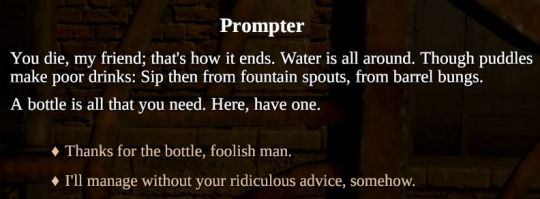

"Puddles make poor drinks" and "Gorkhon water will turn you into livestock": what's up with that?
There is a fairytale about a big sister and the little brother. They walk for a long time and the brother is very thirsty. His big sister keeps telling him to keep going and not to drink from the puddles, like a goat. Eventually the little brother drinks from the puddle.
And promptly turns into a goat.
Rest of the fairytale is about the big sister returning the little brother to his original form.
So, this is where the talks about puddles and water turning you into livestock is about.

The Akela joke did not work at all in the translation.
It comes from Mowgli, which is well known due to the USSR cartoon. In the book (and in the cartoon) the elderly wolf leader Akela misses during a hunt... after which he promptly is deposed as a leader of the pack. Mowgli loses his protection and this is a Big Deal.
So whenever a boss in real life makes a silly mistake (say, throwing a paperball into the bin and missing) everyone thinks it's very funny to say "Akela missed!" implying that they will get a new boss now and the current one will get deposed for this mistake.
Here "Akela never misses" means that Khan being at risk of infection and coming into the nutshell does not diminish his importance at all and his dogheads are just as loyal as before, happily delivering loot to him.

There is a saying: "Better a sparrow in hand, than a stork in the sky."
It means that you should treasure what you have, instead of preferring that which you can't get (so easily).
Lara Ravel references that she can't be happy with the little she has. She wants to help others and for this she needs more.

"Maybe I could be useful to you" is a classic thing that various animals say to people in fairytales, once they are caught and plead for their lives.
I think, this is a popular trope in English fairytales as well, but the phrasing here is lifted directly from fairytales in Russian, so pointing it out either way.
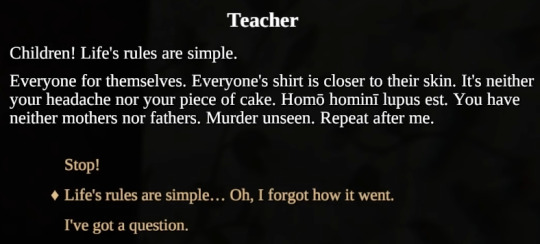
"Everyone's shirt is closer to their skin" is a well known Russian saying.
It means that your happiness and comfort is always more important to you than the comfort of other people. Hence: your shirt is closer to your skin, so you care about it more.
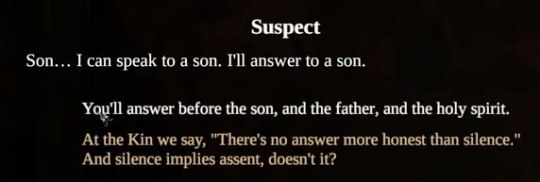
"Silence implies assent" is another popular saying (it even rhymes in Russian).
If someone proposes a course of action and no one speaks out against it or for it, then people usually say "silence is a sign of assent" and consider the matter settled. (Or, more often, people then suddenly say that they disagree and you get a more lively and productive conversation.)
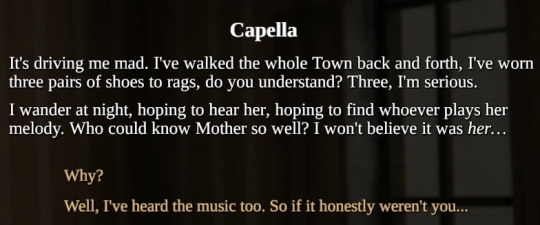
I can't find another screenshot, but Dankovsky says something similar about "I wore down seven pairs of shoes getting to this town".
It obviously could be taken as a factual statement, but most likely it's a reference to fairytales.
In a lot of fairytales the protagonist will be given on a long journey seven pairs of iron boots. Once all of them break, the hero has reached his destination.
Same here: it's a fairytale way of saying that you had a long and arduous journey (or in Capella's case, ran around the whole town for years).
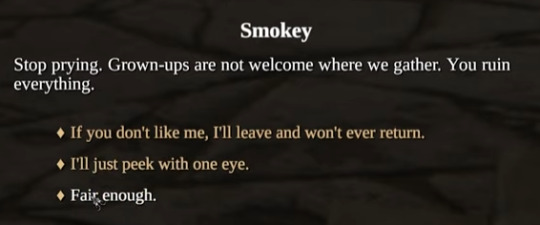
"I'll just peek with one eye" is another popular Russian phrase.
"Can I look?"
"No"
"How about if I look with just one eye?"
Obviously, it's nonsense, but it's a typical thing to say if you REALLY want to look at something, so you just say "pleeeease, I will just look only a little".
#i hope people like this post!#if you have any other phrases that made you think they must be easier to understand in russian#please reply to this post#i'd love to talk some more about stuff#to all russian speaking folks feel free to add whatever stood out to you#pathologic#sonntam talks#ts long post
246 notes
·
View notes
Text
Golden Kamuy was insane.
The protagonist is a Russo-Japanese War vet who regularly performed near-suicidal attacks in battle and survived multiple near-fatal injuries, earning him the moniker "Immortal" which he regularly shouts out during fight scenes. His best friend is a 12 year old Ainu girl who hunts bears and has a pet wolf. The main bad guy is another war vet who's missing his forehead so he wears a ceramic plate over his exposed brain and despite being an irredeemably evil Bond Villain type antagonist, all his inferior officers simp for him to ridiculous levels. The minor adversaries include (but are not limited to) a giant undefeatable escaped prisoner with a pornstache and square-shaped lump on his forehead, a cannibalistic transgender woman who runs a death trap hotel, a serial killer who gets boners when thinking about someone else killing him, Japanese twink Ed Gein, a pervert with a stupid hairdo who dies while fucking a bear and a blind old man who dresses like an owl. Toshizou Hijikata, who was a real guy from real life who existed at one point, is a supporting character. The Ainu girl's father assassinated Tsar Aleksandr II. There's gratuitous cooking scenes between the action and death. The manga is at least partially responsible for kickstarting a Renaissance of Ainu culture in Japan. The author cannot stop talking about his characters' dicks in interviews.
This is one of the most popular manga and anime series of the past 10 years.
#it's been a while since I've read/watched it but this is what stands out the most to me#if you have any other details about GK#please do not hesitate to add to this list#greatest hits#op#talks#golden kamuy#satoru noda#sugimoto saichi#asirpa#lieutenant tsurumi
258 notes
·
View notes
Text
a ramble about arthur's relationship with dutch and hosea
haven't used tumblr in a while (let alone made an actual original post in who knows how long) but i can't stop thinking about that one interaction between dutch and arthur in lakay. specifically: "you sound like hosea." it breaks my heart, because dutch is right in saying that. as chapter six unfolds into the tragedy it is, arthur becomes more and more like hosea, and just like hosea, arthur tries and tries and fails to get dutch, stubborn and single-minded, to see reason.
one of my favourite journal entries, is where arthur says, "i love dutch like a father, but in many ways i love hosea more." arthur loved hosea. hosea saw arthur for who he was. knew arthur wasn't near as dumb as he liked to pretend he was. one of my favourite interactions between arthur and hosea is early on in chapter 3, very shortly after they get to clemens point. arthur walks by hosea sitting at a table, who calls out to arthur and asks what he thinks about dutch's plans. arthur's response is "you know me, i never did much thinking." to which which hosea says one of my favourite lines in the game, and it's a line that gives far more insight into arthur, hosea and their dynamic than you might first think.
dutch was arthur's father in a more abstract way. whether it was dutch's intention or not (and i believe, at the very least, it was later on), i always found his "you're like a son to me" comments to arthur to be very manipulative in nature, meant to reel arthur back in when he's concerned he's "getting away," so to speak. i have personal experience with men trying to get me on their good side by saying i'm like a kid to them, and maybe i'm projecting a little because of that, but the way dutch says that to arthur triggers the same alarm bells in my brain.
again: "i love dutch like a father, but in many ways, i love hosea more." say what you want, but hosea was arthur's true dad. he was his dad in all the ways that mattered. hosea knew arthur so well, he knew arthur was putting on "an angry moron act." in the video i linked, he sounds genuinely frustrated when he continues saying "but it's a thin enough veneer." he knows arthur is capable of more. is capable of being better, and i think hosea knew that things were doomed in the end, whether or not he would admit it.
arthur spent a lot of time, both early in the story and at the end, reflecting on what was happening, on himself, on the other gang members. i like to think he was unconsciously channeling hosea in chapter 6. honestly, the parallels are kind of painful. maybe that's, in part, why dutch was so adamant on not listening to arthur; because he reminded him, painfully, of hosea, his oldest and dearest friend. of course, that's not the only reason, but it makes sense, doesn't it? arthur is so much like hosea, and we see that more and more as the story progresses.
#of course i should mention that i wrote this with high honour arthur in mind as not only is that my preferred way of playing#i also perceive high honour arthur as the canon story#red dead redemption 2#rdr2#arthur morgan#hosea matthews#dutch van der linde#please feel free to add your own thoughts if you have any#i'd love to hear other people's opinions#this was just me wanting to get my thoughts out lol so apologies if it's not the most coherent
107 notes
·
View notes
Text
Sooner or later I've gotta make a better post regarding the appropriation of indigenous terminology by proponents of (certain kinds of) Welsh nationalism. But for now here's a very whistle-stop version of that post. I have a degree in Celtic Studies so these topics are very near and dear to my heart.
[Note: I wrote this post originally during a migraine. I'm revisiting the draft while I'm ill but hopefully can fix this up into something somewhat understandable. As always, this is only a very brief description of the history and I strongly reccomend reading about these topics in your own time to develop a deeper understanding of them. These are topics not even well known in Britain, but if you can spend a short time just to read this, you can help to combat misinformation about British (particularly Welsh) history - and that could aid in preventing the misappropriation of history in the long run. Diolch eto for reading!]
Very often, (certain) Welsh nationalists use terminology that positions the Welsh as if they are an 'indigenous' population who have been 'colonised'. They use language (which in this climate) heavily draws upon the language typically used for peoples who are the victims of British colonialism (of which Wales was an active participant). There's multiple issues with this and many of them lie in whether its appropriate to use this language (regardless of its accuracy or not) as a country which was actively involved in the colonisation of much of the world. What I mean in short is that additional language is needed which doesn't step on the toes of endangered cultures and groups directly affected by British colonialism.
Wales not only participated in British colonialism as a whole (alongside Scotland, Ireland* and England) but itself colonised parts of patagonia in Argentina.
I can't think of any similar terminology to 'indigenous' or 'colonised' which would also get the idea which is meant across. 'Native' in certain contexts is permissible, e.g. 'native speaker' in the context of a Welsh speaker. But in other contexts other than langauge, things get tricky when you argue 'nativeness' (this is a topic I will come back to - especially re. Celtic as a language descriptor vs Celtic as a so-called ethnicity). When (certain) Welsh nationalists talk about being 'indigenous' , being 'native' or 'colonised' what is meant by that?

(Map of the expansion of the Bronze Age Bell Beaker culture circa 2400 BC in Britain and Ireland) - from this map
What makes a Welsh person 'indigenous' to this island that doesn't immediately disqualify other peoples who also have a deep history here? Historically, the island of Britain has been lived on by many, many peoples.
In the Bronze Age you had the arrival of the Bell Beaker people. Then in the Iron-Age, you had tribes speaking (mostly) Brittonic. I say mostly, because we have direct evidence that in the Iron Age Gaulish speaking tribes also moved to parts of Britain but later became integrated with the rest of the population (which, I will add, were not a united peoples but a scattering of different groups who often went to war against each other). Then the Romans invaded Britain (and much of Western Europe) and over time integrated into the local population. So now Britain is Romano-British. Eventually the Western Roman Empire collapses and Britain enters into the sub-Roman Britain phase of its existence. Kingdoms begin to form, with the population speaking Brittonic and British-Latin. So you have different kingdoms in (what would become Wales) and in (what would become Northern England and Southern Scotland) you have more Brittonic-speaking kingdoms.
These kingdoms were also not a united peoples. They shared a language - but it's like claiming that Ancient Greeks were a united people simply because they all spoke Greek. Sparta, Athens, Cornith etc. were independent of each other and the same is true of the kingdoms of the Hen Ogledd (the Old North) and the kingdoms of Wales. They all had a common language but also went to war with each other sometimes. Eventually, the Brittonic language began to diverge into different languages. Namely, Old Welsh and Cumbric (the language spoken in what is today Cumbria, Lancashire, Northumberland and Southern Scotland). The two languages were still very closely related but had diverged by a certain point.
At the same time this is happening, Anglo-Saxons begin to arrive in what is now Kent. They form kingdoms and the Britons living there are either displaced or become absorbed into the Anglo-Saxon populace. Then the Norse rock up and conduct viking raids around the coast before finally settling in parts of the country and forming their own territories.
So now Britain has several groups living on the island (keeping in mind even before settlement from the Anglo-Saxons and the Norse that the British kingdoms were already composed of different groups themselves). Northern Scotland was also having a time re: Picts, Gaels and Britons - but we'll gloss over that for brevity. Also, Ireland was also raiding the Welsh coast at this time too.
Then the Normans rock up and in 1066 William the Conqueror, well, conquers. More history happens after this point but I will try and keep this as brief and as non-messy as I can.
So, to recap:
One of the earliest cultures in Britain was the Bell Beaker people in the Bronze Age. They had their lands settled by the Iron Age Britons ('Celts'). Then the Romans came and the 'Celts' became Romano-Britons. After the Western Roman Empire collapses the remaining population forms kingdoms with distinct political identities. These kingdoms eventually find themselves fighting the Anglo-Saxons and the Norse. Then the Normans turn up and so on and so forth.
So- which group is the original native group to Britain? (Trick question - this question cannot be satisfactorily answered in favour of one group without leaning into claims of historicity which the other groups can also claim).
Which brings me to modern Welsh identity and those who came before.
Something I see in Welsh nationalist groups is a claim to the legacy (or even claims of direct descendance from) the Iron Age Britons (commonly called Celts for shorthand, but as I said before I'm gonna get back to that point). And this narrative is what the "Welsh people are native to Britain" argument is based off of.
It may seem like #praxis to argue the Welsh people are the true inhabitants of Britain and the English are evil invaders. But you have to make *several* logical leaps to get to that point if you're genuinely arguing that point.
For starters, many more people than just the Britons (read: Romano Britons/early Brittonic kingdoms) have called Britain home since the Early Middle Ages. For example, there's the settlement of Scotland by the Gaels, the Irish settlement of certain parts of costal Wales. You have (much later) Roma and traveller groups, Jewish diaspora and many more diverse cultures and peoples existing in Britain at this time. The Romano-British population, which developed into the Early Middle Ages kingdoms of Wales and the Hen Ogledd, was also multicultural. Many black Romans started families with white Britons. By the sub-Roman period, Britain was ethnically and culturally diverse.
But those who argue in favour of a such thing as 'Celtic ethnicity' in order to support the idea Britons (and only Britons) were native to these islands typically imagine that history as white. White Brits, white Romans, white Gaels. When we know this isn't true. Did you know that the Northernmost Ancient Egyptian temple in the world is in Yorkshire because Roman Egyptians in the military brought their religion with them? Mary Beard did a fantastic documentary about a Roman Soldier from modern day Syria who was stationed at Hadrian's Wall who started a family with a British woman. Point is, that some people like to imagine a purely white Britain that they can pine for. And I'm afraid it simply isn't true. The version of history many white supremacists look to simply didn't exist.
I'll quickly bring up one last point before I draw this to a close. And it's about Celtic as a linguistic term vs Celtic as a so-called ethnicity. You see, any first year Celtic Student would tell you that there is no such thing as 'Celts'. Crazy, I know from people studying *Celtic* studies. But hear me out - there is good reasoning why (beyond language groups) Celtic is not a good term for describing an ethnic group. Much of it relates to what I've already mentioned, but we categorise Ireland, Scotland, Wales, Mann, Cornwall and Brittany as Celtic not because of the ethnicity of the people living there (which I've mentioned is pretty diverse) but because they are all places where Celtic languages are spoken. It wasn't until Edward Llwyd (d. 1709) that the term Celtic was coined to describe these languages. Up until that point, nobody was thinking of Irish and Welsh as related because the languages do not sound like they have a common origin. By extension, people didn't think of the Welsh and Irish as being the same peoples (or Celtic) either. Its only in the modern day there is a sense of Celtic identity. The Iron Age Britons were not going around calling themselves Celts. There was no common Celtic identity. But very often people argue Celticness based on a pseudohistory which insists on a false and misleading interpretation of history. Whether or not Celticness exists now is a different matter entirely. But it sure does not rest upon race or ethnicity as a qualifier. This is quite foundational stuff to first year and above Celtic Scholars, but is not generally well known outside of academia because the misinformation is quite strong. So if you read is far, diolch mawr and please share this with anyone you think might be interested in it. Any amount of knowledge of these things would greatly improve understanding of what it means to be Welsh and what it means to speak a Celtic language.
Lastly,
all of that begs us to ask the question:
What does it mean to claim nativeness in a Western European context?
More under the cut
What does it mean to claim nativeness in a Western European context? Especially in a Western Europe post-colonialism.
It means, to me, to claim what isn't our right to claim. To argue and make our points with language that isn't ours and isn't designed to be ours. That this language of indigeneity may sound appealing, but is it improper to use this terminology when our country was directly responsible for the atrocities in which this very language became relevant?
What do we do in response to the misinterpretation of our culture instead of relying on language of indigeneity? These are the questions I want to leave you with and invite you to share your thoughts on. How do we build a Wales which advocates for itself without relying upon inaccurate language which betrays a reliance upon the ahistorical to make its point?
What kind of Wales do we want to live in?
#cymraeg#welsh#cymru#cymry#cymblr#Wales#welsh language#welsh nationalism#nationalism#indigeneity#?#white supremacist mention#white nationalism cw#please add on if you have any thoughts on the matter - I'd love to hear other's takes on the topic!#this post was also mostly made when I was ill/had a migraine so it may not be perfect#but gets most of what I want across well enough I think
101 notes
·
View notes
Text
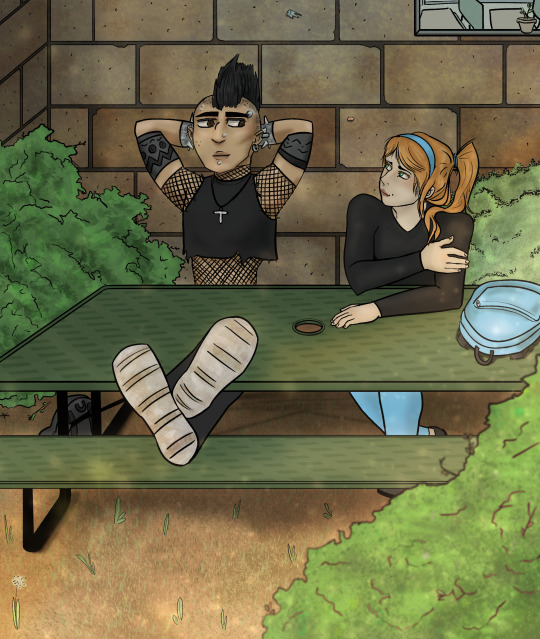

Lineart by me! (extra info for colorists in og tags) I couldn't resist a dappled light variant on this. @green-with-envy-phandom-event
fun fact: this lineart originally had the actual lunch/picnic table ridges and then i realized that was too much, especially without access to the layers of lineart (personally, I would color the lineart for the table and then the support bars would be colored and the layer moved underneath the table top. I decided not to put colorists in a position to try to color it with one layer of lineart, but I did get quite far before making that decision)

#greenwithenvy2024#danny phantom#jazz fenton#danny phantom spike#hello! i noticed that there were some lines i didn't close up and technically jazz's shirt has some lineart missing (where the hair drapes)#so colorists! you guys are free to add the necessarily lines to close any areas/add missing details with the exception of the bushes#please keep it reasonable tho! a few pixels here and there is all that's really needed#i really should have caught it before I submitted it originally so a massive “sorry” to you all#also feel free to color my lineart!!!!! especially on the piercings and stuff#doing so many other people's linearts and then my own really made me consider what i do and don't like on linearts in the coloring phase#so a big appreciation to this event for giving us lineart/colorists that opportunity to explore!#if you guy see me switch my lineart brush to something more solid/regular and closing all my open lines after this.... don't worry about it#dp jbee
59 notes
·
View notes
Text
*points at fictional traumatised middle aged repressed gay man* this bad boy can fit so much projection of my own problems in him
#or middle aged man PRESENTING#aziraphale#the captain#stede bonnet#good omens#bbc ghosts#our flag means death#if you have any other characters i can add to the list#please feel free to share
173 notes
·
View notes
Text
ENOUGH WITH THE SECURITYWAITER ANGST reblog with your answers
which one hogs the blanket? which side of the bed to they each sleep on? which one gets cold easily and which one holds their hands to warm them up? which one of them is a swimmer and which one can barely float? who proposes to who?
#i say this as if im not the one going “but wait we can add angst to this”#but seriously i have so much brainrot#please tell me any and all thoughts you have about these two#i need to talk about them#i say this while i have asks in my inbox but GIVE ME MORE#me taking all the hcs about them and hoarding them for possible future fics#ill answer my personal thoughts for these questions in the morning bc i want to see what other people say#kitty.twt#fnaf#fnaf movie#mike schmidt#ness the waiter#securitywaiter#fnaf ness#dreamtheory
93 notes
·
View notes
Text





do you wanna send me art rqs I promise I can actually draw sometimes

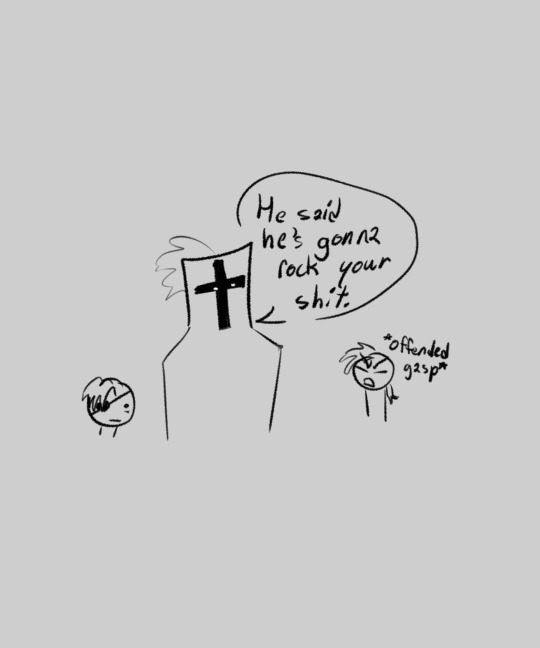
#thank you anon who asked about the xing gang a minute ago. that was pretty swag#lou is an artist#spenxer lou art#roleswap au#fma au#fma#fmab#fullmetal alchemist#fma brotherhood#fullmetal alchemist brotherhood#alphonse elric#ling yao#edward elric#I'm still struggling with picking a name for him/this au. I really liked the tongued alchemist. but. it doesn't have the best ring to it.#like roy calling al 'tongued'? what the hell do I do with that.#if you have suggestions I will literally make out with you sloppy style I need them#if you want any other context for this au you can uhhh. probably search up 'fma au' on my blog that'll probably pull it up methinks#errmmmm. yeah#ALSO I tried. to add text ID stuff in the alt methinks. if I fucked it up please tell me how I can fix it I do not know what I am doing.
25 notes
·
View notes
Note
Do you think there's a reason why Mr Darcy is so popular?
Yes! Many reasons.
Firstly, this is something that I think the Reading Jane Austen podcast brought up and I think it's very insightful. Darcy, though I don't think he's shy, is very much an unsocial clam; he's reserved. Elizabeth is one of the very few people he opens up to, especially at the end of the novel. That sort of exclusivity is very sexy to some people, as stated in Emma:
“It is a most repulsive quality, indeed,” said he [Mr. Knightley]. “Oftentimes very convenient, no doubt, but never pleasing. There is safety in reserve, but no attraction. One cannot love a reserved person.”
“Not till the reserve ceases towards oneself; and then the attraction may be the greater." [Emma]
Secondly, Darcy is portrayed as a Byronic hero in P&P 1995 and a lot of JAFF (think dark, brooding, and mysterious) so I think many people consider him one. I'm not an expert on what women like, but I know during Byron's lifetime a lot of women just ate up these sort of men with a spoon. Here is a description from Wikipedia of a Byronic hero:
Historian and critic Lord Macaulay described the character as "a man proud, moody, cynical, with defiance on his brow, and misery in his heart, a scorner of his kind, implacable in revenge, yet capable of deep and strong affection"
I don't think Darcy is a Byronic hero, if anything he's a subversion of Byronic. While he is proud, cynical, and capable of strong affection, he turns out not to be vengeful. Darcy's implacable resentment towards Wickham is built on a firm foundation and he hasn't acted on it! I think Byronic!Darcy would have hunted Wickham down and killed him. (Willoughby is also totally a fake Byronic hero, his "deep and strong affection" is false).
Side Note: A lot of JAFF has Darcy hunt Wickham down and duel him.
Third, I think a lot of people love the idea of someone being so overcome with irrepressible passions that they propose despite their better judgement. This might be why Darcy "compromises" Elizabeth so much in JAFF. While I'm onboard for passion leading to proposals, I'm not wild about passion leading to unwanted kissing.
Fourth, Darcy does some very sexy things, like listening to what women say and offering to stop going after a woman. These traits are so freaking rare that they make women swoon. It's honestly pitiful that we still are just looking for a man who will take no for an answer with grace! Like listen to this: "If your feelings are still what they were last April, tell me so at once. My affections and wishes are unchanged; but one word from you will silence me on this subject for ever.”
"If you don't like me, I'll leave you alone." HAWT. SEXY. Makes me feel safer walking at home in the dark. GIVE ME MORE!
Lastly, I think people really love the enemies to lovers trope and Darcy is one half of that in Pride & Prejudice.
#question response#if you have any other reasons please reply#I didn't add “colin firth” as a reason but I'm sure it's up there#pride and prejudice#mr. darcy#fitzwilliam darcy#jane austen#theories
187 notes
·
View notes